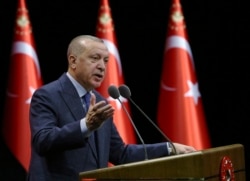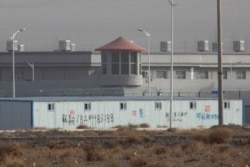As international condemnation increases over the China’s crackdown of the Uighur minority in Xinjiang province, a growing number of experts and activists are criticizing Turkey over what they call Ankara’s deliberate silence influenced by China’s economic and political influence.
Uighurs and Turks share a common linguistic, cultural and religious heritage with Turkey.
“Turkey is the country that must be most outspoken about the persecution of Uighurs, because of the historical and cultural ties between Uighurs and Turks. And that was indeed the case until late 2010s,” according to Mustafa Akyol, a senior fellow at the Washington-based Cato Institute.
Akyol said Turkey since the rise of Recep Tayyip Erdoğan in 2003 has presented itself as the leader of oppressed Muslims in the world, particularly the Rohingya in Myanmar, Kashmiri Muslims and the Palestinians. However, the country has been “utterly silent” on Uighurs.
“I think all this is caused by Turkey’s new ruling ideology, its anti-Western perception of the world, and its affinity with non-Western powers that include both Russia and China,” Akyol said, adding that pro-China lobbying in Turkey has attempted to convince Turkish officials that concerns about Uighurs are “lies of the CIA.”
When deadly clashes broke out between the Uighurs and Han Chinese in Xinjiang’s capital Urumqi in 2009, Erdogan came out strongly against Chinese officials, saying the incidents were “simply put, a genocide.” However, the Turkish government last October refused to join 23 nations in joint a statement to call on China to end violations against Uighur Muslims.
Changing rhetoric
Uighur activists say Erdogan’s government in recent years has ceased its strong rhetoric on the issue even as China’s measures in Xinjiang since 2017 have invited a global condemnation.
During a press conference Saturday after meeting with his Chinese counterpart, Wang Yi, on the sidelines of the 56th Munich Security Conference, the Turkish Foreign Minister Mevlut Cavusoglu told reporters “we support one China,” while stressing Turkey’s wish for Uighurs to have their “full rights.”
“And there are countries which are using this subject against China. We are not joining their propaganda,” Cavusoglu said, adding that the Chinese government has invited Turkey to send a delegation to the region but it was unclear if the visit was going to take place.
“We don’t wish any terrorist attack against China because we suffered a lot from terrorist attacks ourselves in this country. But a terrorist can come from any ethnic group, can be a Turk, Uighur Turk, Han Chinese, or that terrorist can be Buddhist, Christian. But we are telling in every meeting with our Chinese counterpart that for one person being a terrorist, calling the whole Uighur Turks terrorist is not right,” he told reporters.
Seyit Tumturk, the head of East Turkistan National Assembly based in Kayseri, Turkey, told VOA that Turkey’s policy shift toward Uighurs is the result of China’s increasing economic influence over the years. He said China has expanded its economic relations with Turkey through various infrastructure investment projects, such as high speed rails, bridges and nuclear energy plants.
“Turkey’s capitulation on the Uighur issue is due to geopolitical and strategic needs of the country which is fueled by political and economic uncertainty following the coup attempt in 2016 and recent development in U.S. and Turkey relations,” Tumturk said.
Gradually, these investments “are making Turkey more reliant on Chinese money,” he told VOA.
Economic leverage
Turkey and China in 2010 signed eight strategic cooperative relationship pacts to increase their annual trade volume to $50 billion by 2015 and $100 billion by 2020. Trade volume between the two countries increased from $1.1 billion in 2001 to $23.6 billion in 2018, according to the Turkish Trade Ministry.
China’s growing economic leverage over Turkey means Turkish officials are afraid that any strong position toward Xinjiang will likely cost the Turkish economy even as China escalates its campaign against Uighurs, Tumturk added.
1.8 million detainees
China since 2017 has been accused of holding some 1.8 million Uighurs, Kazakhs and other Turkic groups in detention camps in northeast China’s Xinjiang autonomous region. More recently, rights organizations say some of the camp detainees have been transferred to work in factories for minimal wage and allowed to return their home only once a week.
Chinese officials have rejected those accusations, saying the camps are merely “vocational training centers” set up to “reeducate” the Uighur community members. Beijing has tied its policies in the region to fighting “the three evils of terrorism, extremism and separatism.”
There are an estimated 12 million Uighurs in the world who are ethnically Turkic and religiously Muslim. More than 90% of them are believed to live in their ancestral home of Xinjiang in China’s northwest region. The minority group often refers to Xinjiang as “East Turkestan,” accusing China of a decades-long campaign to change the demographics of the region by forcing them out and replacing their communities by the majority Han people.
Turkey has historically been a haven for those Uighurs who have fled China. In the 1950s, Turkey accepted hundreds of Uighur refugees fleeing Xinjiang with settlement aid from the U.N. and later offered them Turkish citizenship. The arrangement marked the first large Uighur mass migration from China to Turkey in the 20th century.
Uighur refugees
Uighur organizations say nearly 45,000 Uighurs live in Turkey now, with almost 10,000 of them as refugees. Those who do not have refugee status have been granted temporary or permanent residence status, or in some cases, Turkish citizenship.
Between 2014 and 2015, despite China’s opposition, hundreds more Uighur refugees who illegally crossed China’s border to Myanmar, Vietnam, Thailand and Malaysia were given Turkish travel documents at the Turkish Embassy in Kuala Lumpur, Malaysia.
One of the Uighurs who fled from China to Turkey, Ihsan Karatal, told VOA that there was a growing unease among the Uighur community in Turkey over Ankara’s changing position on Xinjiang.
Karatal moved to Turkey in 2018 along with his wife and three children after residing in the United Arab Emirates (UAE) for eight years. He said his family left UAE when some of his fellow Uighurs disappeared and rumors surfaced that they were repatriated to China.
“I found out that Turkey was a country I could go to easily and apply for a residence permit and more importantly the country wouldn’t deport us to China to face torture or death,” Karatal said.
“With my three children and wife, I applied for permanent residence at the Immigration Bureau in Istanbul after we arrived two years ago. Now we all have Turkish permanent residence permits. The best thing is we feel much safer here than anywhere else we have lived,” he said.
Kartal said the Turkish government over the months has been more reluctant to give Uighurs citizenship, making many of them feel vulnerable if Turkey-China relations further improve in the future.
“Even though I have residence permit, I don’t know when Turkey gives me a pass to citizenship and right now I can’t have work permit and am struggling to find work and sustain my family. On top of that, Turkey’s closeness to China makes my life more miserable because it means Turkey is staying away from what is happening to the Uighurs in East Turkistan where the rest of my family is,” he told VOA.









